
FfD4: Giulia Mascagni shares insights on ‘tax era of development’ at Casa Devex
Day 1 of the Fourth the Financing for Development Conference (FfD4) in Seville, ICTD Executive Director Giulia Mascagni was interviewed at Casa Devex about the role of domestic resource mobilisation in global development financing. She said: “It’s obviously very concerning to see a decline in aid […] but at the same time, it’s also important to remember that aid was never really going to be enough to fill the financing gap, or to finance development agendas to achieve the sustainable development goals.”
Mascagni added: “There’s a cause for optimism, because in this new era of development — we’ve been calling it at ICTD the tax era for development — it really builds on a very strong foundation that’s based on evidence specific to lower-income countries. And there’s definitely a clear road map on what can be done.”
The following day, Devex mentioned in its wrap article the Coalition on Tax Expenditure Reform, of which ICTD is part.
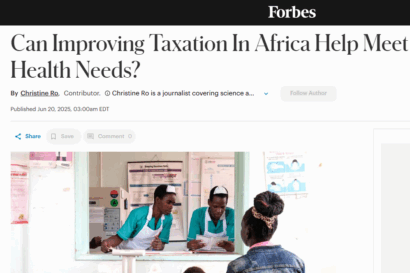
Giovanni Occhiali quoted in Forbes article
ICTD Research Fellow Giovanni Occhiali shared his insights in a Forbes article, entitled “Can Improving Taxation in Africa Help Meet Health Needs?“, on the risks and opportunites African countries face in terms of improving current tax systems to address development demands, amidst “waning foreign assistance around the world”. “‘[T]here is a risk that governments facing immediate cuts … might be incentivised to take short-term action that might prove counterpoductive in the long term,'” he said in part.
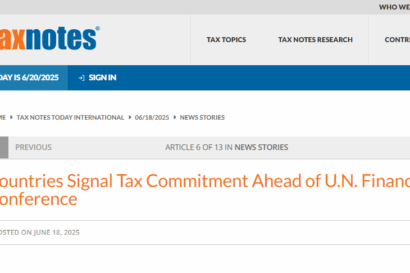
Tax Notes quotes Rhiannon McCluskey on value of DRM in development financing
ICTD policy consultant Rhiannon McCluskey was quoted in a Tax Notes article on the critical role domestic resource mobilisation, specifically taxation, plays as countries prepare to head to the Fourth Financing for Development (FfD4) conference in Seville in the end of June. McCluskey said as countries face growing fiscal pressure, given dramatic cuts to aid budgets, among others, they will tend to make quick decisions on tax policy. She cautioned, however, that “when these are not informed by good evidence, they can really backfire.”
Read more of ICTD’s work around FfD4 here.
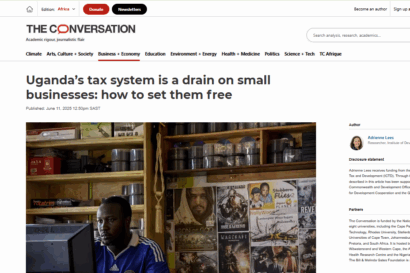
Adrienne Lees pens piece on tax compliance costs for Ugandan firms for The Conversation Africa
ICTD Doctoral Fellow Adrienne Lees published a blog on the cost of tax compliance for small and medium-sized enterprises in Uganda, in the context of the country’s “increasingly complex tax system”.
“The complexity of Uganda’s tax system makes for a time-consuming tax filing process, compounded by low taxpayer knowledge and high levels of distrust in teh Uganda Revenue Authority. The time, money, and effort incurred by taxpayers tomeet their tax obligations adds to their total tax burdens,” she argues. Read the full article here.
The blog was also carried by at least three local and regional outlets, including Uganda Business News, AllAfrica, and The Independent.
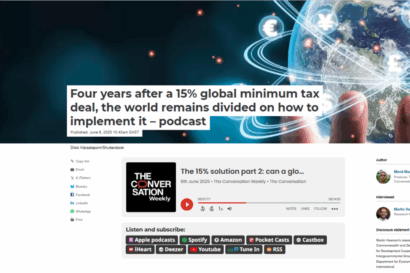
Martin Hearson weighs in on 15% global tax deal in The Conversation Weekly podcast
ICTD Research Director Martin Hearson, who also leads the Centre’s International Tax programme, was interviewed in a recent episode of The Conversation Weekly podcast about the October 2021 global tax deal that requires large multinational companies to pay at least 15% in corporate tax.

Max Gallien, Vanessa van den Boogaard, and Umair Javed pen op-ed on Zakat work
ICTD Research Fellows Max Gallien and Vanessa van den Boogaard, co-leads of the Centre’s Tax and Informality Work, along with Umair Javed, pen an op-ed on the Dawn on their work on Zakat and Pakistan.

ICTD-RRA paper cited in The New Times
The New Times, a leading media outlet in Rwanda, cited a joint reflection paper by ICTD and the Rwanda Revenue Authority (RRA), originally published in 2021, in a report on how the country intends to implement a tax on digital services. Read the article here.

Max Gallien, Martin Hearson, and Mary Abounabhan reflect on Ghana’s scrapped e-levy on The Conversation Africa
ICTD researchers Max Gallien, Martin Hearson, and Mary Abounabhan wrote a piece for The Conversation Africa on the lessons learned from the scrapped electronic transfer levy (e-tax), which was later widely carried by media outlets across the continent, including Africa Leader, Ghana News, Africa Press, and Modern Ghana.

Giovanni Occhiali weighs in on taxing the wealthy in premier South African news channel
Newzroom Africa, one of South Africa’s most-watched TV news channels, interviewed Giovanni Occhiali on effective strategies to increase the tax contributions of high-income countries across the continent. Watch the report here.
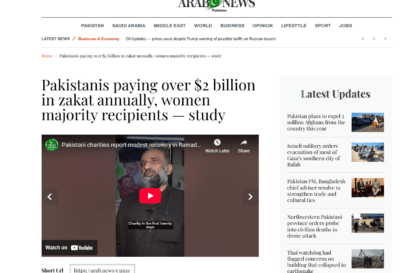
ICTD study on zakat garners media attention as Ramadan concludes
ICTD’s work on zakat, led by Informality and Tax co-leads Max Gallien and Vanessa van den Boogaard, along with Umair Javed, was featured in several news outlets and wires, including Arab News, Ground News, HT Syndication, Daily Times, Press News Agency, Propakistani, The International News, Geo News, and MSN.

Giulia Mascagni pens a Letter to the Editor of the Financial Times
ICTD Executive Director Giulia Mascagni published a letter to the editor of the Financial Times on the need for “responsible donors” to support tax capacity building in the context of aid budgets being slashed.

Giovanni Ochialli writes piece for ‘The Conversation Africa’ on taxing the wealthy
ICTD Research Fellow Giovanni Occhiali wrote an article for The Conversation Africa outlining strategies African countries can adopt in order to tax their wealthy citizens more effectively, based on a recent ICTD Policy Brief, co-authored by Occhiali, Giulia Mascagni, Wilson Prichard, and Martin Hearson.
The article was then republished by over 20 media outlets across the continent, including Africa Leader, Africa Press, Modern Ghana, South African Business News, The Independent, The African Mirror, and AllAfrica (also in French).